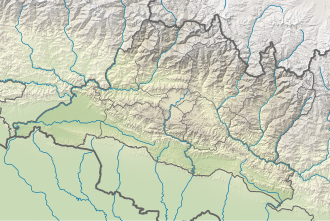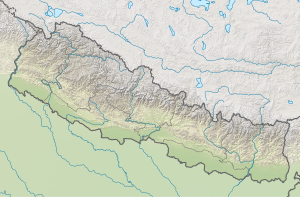Ichchhakamana Rural Municipality
Rural Municipality in Bagmati Province, Nepal From Wikipedia, the free encyclopedia
Ichchhakamna (Nepali: इच्छाकामना) is an only rural council located in Chitwan District in Bagmati Province of Nepal.
Ichchhakamana
इच्छाकामना गाउँपालिका | |
|---|---|
| Coordinates: 27.82°N 84.57°E | |
| Country | Nepal |
| Province | Bagmati Province |
| District | Chitwan |
| Wards | 7 |
| Established | 10 March 2017 |
| Government | |
| • Type | Rural Council |
| • Chairperson | Mr. Dan Bahadur Gurung (दानबहादुर गुरुङ)(CPN-UML) |
| • Vice-chairperson | Mrs. Maya Silwal (माया सिलवाल)(CPN-UML) |
| Area | |
• Total | 166.67 km2 (64.35 sq mi) |
| Population (2011) | |
• Total | 25,012 |
| • Density | 150/km2 (390/sq mi) |
| Time zone | UTC+5:45 (Nepal Standard Time) |
| Headquarter | Kurintar |
| Website | ichchhakamanamun |
Total area of the rural municipality is 166.67 square kilometres (64.35 sq mi) and total population is 25012 individuals.[1][2][3]
The rural municipality was formed on 10 March 2017, when Government of Nepal announced 753 local level units as per the new constitution of Nepal 2015.[4] thus the rural municipality came into existence. The rural council was formed merging following former VDCs: Darechok, Chandi Bhanjyang, Kaule and Dahakhani. The rural council is divided into 7 wards and the admin center of the rural council is located at Chandi Bhanjyang
Demographics
At the time of the 2011 Nepal census, Ichchhakamna Rural Municipality had a population of 25,067. Of these, 58.5% spoke Nepali, 21.8% Chepang, 7.4% Magar, 7.1% Gurung, 1.9% Tamang, 0.9% Bhojpuri, 0.8% Newar, 0.3% Hindi, 0.3% Maithili, 0.3% Thakali, 0.3% Urdu, 0.2% Bhujel, 0.1% Rai, 0.1% Tharu,[5]
In terms of ethnicity/caste, 33.4% were Chepang/Praja, 26.8% Gurung, 12.0% Magar, 4.8% Hill Brahmnin, 4.5% Chhetri, 3.9% Tamang, 3.2% Kami, 3.1% Newar, 3.0% Gharti/Bhujel, 1.3% Damai/Dholi, 0.8% Sanyasi/Dasnami, 0.6% Musalman, 0.5% Teli, 0.4% Thakali, 0.3% Rai, 0.2% Kalwar, 0.2% Kathabaniyan, 0.2% Tharu, 0.1% Kumal, 0.1% Majhi, 0.1% other Terai, 0.1% Thakuri, 0.1% Yadav and 0.4% others.[6]
In terms of religion, 61.3% were Hindu, 26.5% Buddhist, 7.9% Christian, 3.6% Prakriti, 0.6% Muslim and 0.1% others.[7]
Ward Profile
Presidents of Wards[8]
References
Wikiwand - on
Seamless Wikipedia browsing. On steroids.

